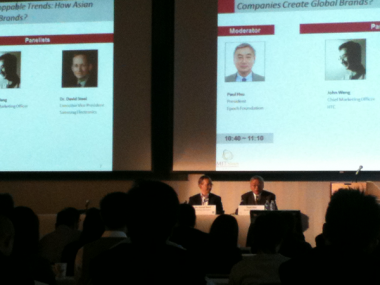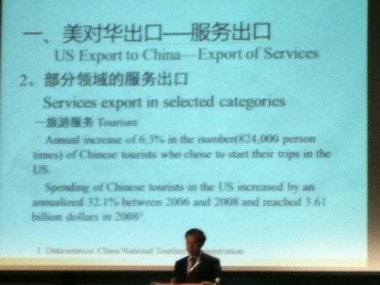Day-Long Conference At MIT Media Lab Brought Together Business Leaders, Academics, Students And Media#

This weekend, Jing Daily had the privilege of attending the MIT Sloan Asia Business Conference, a day-long event that brought together a range of executives in the Asian business arena, MIT faculty and students to discuss "Industries, Insights and Innovations for the Next Decade." Kicking off with opening remarks from David Schmittlein, the Dean of MIT Sloan, the first morning keynote was delivered by Yuan Chen, Chairman of China Development Bank, who discussed the role of his bank in promoting not only the economic development of China but also more economic cooperation between China and other Asian countries and the West. As Yuan said, as Asia has become a major driving force in the global economy, cooperation between Asian economies is becoming an "irreversible trend."
Next, John Wang, Chief Marketing Officer of HTC, introduced his company and its current marketing approach, which Wang described as consumer-driven. By listening to consumers and producing products with customer-focused features, Wang said, HTC can enact its company motto of being "quietly brilliant," taking a hands-off approach to branding by letting others do the talking for them. After Wang's presentation, Dr. David Steel, Executive Vice President and head of strategic marketing for Samsung Electronics North America, discussed the challenges he faced when joining Samsung in the mid-'90s and later as he moved from the South Korean team to North America in 2008. Speaking on the differences of doing business in Asia versus Western countries, Steel said that flexibility, nuance, and networking are the keys to success in Asia, adding that the biggest challenge is adapting to different markets.
Next, David Steel was joined by John Wang and moderator Paul Hsu for the day's first panel discussion on "Unstoppable Trends: How Can Asian Companies Create Global Brands?" Building a consistent brand globally, is a huge challenge, said Steel, as Asian companies have not had a very long history of doing this. By moving into new fields -- whether semiconductors or LCD screens -- Steel said that Samsung has proven itself one of Asia's most capable companies on a global level, and he expects many more Asian countries to gradually move into global top 100 lists. Wang said that companies should make sure they can "fail very fast and fail very cheaply." Companies should optimize for failure, rather than success, to ensure missteps are efficient and cheap, and push the company forward rather than holding it back.

The next panel, on "Innovations in the Asian Perspective," included viewpoints from Oliver Chow (MediaTek), Jungwook Lim (Lycos), Luis Xavier Rojas (Pfizer Animal Health) and Yuwen Liu (BioBay). This wide-ranging discussion covered everything from diversifying distribution channels to account for theft by pirates -- literal pirates -- to the role of the Chinese government in promoting the development of its domestic pharmaceutical industry. In this field, as Yuwen Liu of BioBay opined, "the Chinese government is the biggest angel investor in the world." Next, RC Liang of Delta Electronics, Nick Sugimoto of Honda Strategic Venturing, and Daxi Li of the Chinese Association for Science and Business spoke to Professor Donald Lessard about the future of energy and clean technologies in Asia.
Delivering the final keynote, Shintaro Hori of Bain Capital Asia discussed the future of business in Japan, noting that despite all reports of Japan being in terminal decline, Japanese companies still have a vast amount of undervalued potential. As Hori pointed out, nearly 2,500 Japanese corporations have over $500 million in annual sales, with 459 Japanese companies in leading positions worldwide. The key, Hori suggested, is how to change the Japanese corporate culture from passively "panning for gold sand in a river" to actively "mining for gold." Amid all the bad news about Japan, Hori said, the good news is that global opportunities are there if these companies have the right leadership and aspirational goals.

The next panel discussion on "Investment Trends and the Role of Capital in Emerging Markets" brought together Paul Hsu of the Epoch Foundation, Tri Thong Le of Dong A Bank, Alan Chang of Capricorn Investment and Jiwei Zhang of Caixin Media Group. Moderated by Deputy Dean S.P. Kothari, this discussion covered issues as diverse as investment opportunities in Vietnam, the important role that SMEs play in supporting an economy in times of economic fluctuation, and the current state of media in China. Following this panel, Fu Zhiying of the China Ministry of Commerce delivered a special guest lecture on the growing economic interdependence of the United States and China, and how both sides have benefited despite outward political acrimony and rhetoric that often suggests the opposite.
The final panel discussion of the day, "Founder's Journey: How to Launch a Business in Asia?" offered personal experience from four entrepreneurs: Martin Trust of Brandot, Terence Swee of Muvee Technologies, Roger Xie of China PharmaHub, and Hemmie Chang of Ropes & Gray LLC. With four different individuals with four very different stories about doing business in Asia, this discussion provided a valuable glimpse into the always-changing world of Asian business, particularly in China.
Wrapping up the evening, closing remarks were delivered by Professor Yasheng Huang, followed up by an evening reception. Despite the length of the conference, attendees took away a great deal of new information and made many new connections that could potentially inspire a new generation of business leaders both in Asia and the West.
The Jing Daily team would like to personally thank the organizers, the MIT Media Lab, the MIT Sloan School of Management, and Paul Denning and Patricia A. Favreau.